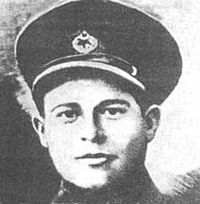- Menemen Incident
-
The Menemen Incident (Turkish: Kubilay Olayı) refers to a chain of incidents which occurred in Menemen, a small town in the Aegean region of Turkey, on 23 December 1930. It is commemorated every year by the state and Turkish Army.
Contents
Rebellion
Following the signing of the Treaty of Lausanne in 1920, the Republican People's Party of Turkey pursued a somewhat liberal policy towards Islam, promoting secularism while not taking a hard line against Islamic institutions and practices, believing that the secularism of their ideology was already taking root.[1] This confidence was shaken on 23 December 1930, when Dervish Mehmed Efendi, a member of the Naqshbandi order, created a disturbance by rallying a crowd against secular government and calling for the restoration of Islamic rule and the Caliphate. A contingent of Turkish forces from the local garrison was sent to quell the demonstration and was initially overwhelmed by the crowd. The crowd then beheaded the leader of the contingent, Lieutenant Mustafa Fehmi Kubilay, and placed his severed head on a pole with a green flag before parading through town with it.[2]
Reaction
The Republican government of Turkey was shocked by the grisly demonstration of religious fervor and by how readily it was embraced by Turkish locals so close to the nation’s capital, as it was completely antithetical to secularism. Furthermore, it demonstrated that secularism was taking hold neither as quickly nor as deeply as the government would have liked.[3] This spurred the Republican government to action, as they began a more aggressive secularization policy in response to the Menemen incident. The government carried out this policy by attempting to nationalize Islam through performing the azaan, or call to prayer, in Turkish, as well as encouraging secularization in schools and translating the Quran into Turkish to have it read to the people on the radio and in the mosques.[4] These attempts reflected a comprehensive effort by the Republican government to push back against Islamic influences and entrench nationalism more deeply in Turkish culture. These effects also reflected a larger attempt on the part of the Republican government to consolidate Turkish identity and promote nationalism to replace the last vestiges of nostalgia for the Caliphate and the Ottoman Empire in the years following the break-up of the Ottoman Empire after World War I.
Greater Context
The Menemen incident marked the beginning of a harder line taken by the Republican government against Islamist and other dissident organizations, which were strictly regulated or crushed by Ataturk. Furthermore, it prompted the creation of a more coherent ideology known as Kemalism by the Republican government of Turkey at the third party Congress. Kemalism’s six principles included republicanism, nationalism, populism, statism, secularism and revolutionism. These six principles formed the core of the government’s attempt to establish an ideology that would replace religion with patriotism, and move from traditionalism towards modernity. The Menemen incident was a direct catalyst for the creation of the “Six Arrows” of Kemalist ideology, as it served as a warning to the government that their previous efforts at promoting nationalism were insufficient. It is thus one of the formative moments in the history of Turkish nationalism, and marked a major turning point in the efforts of Atatürk and the Republican regime in Ankara to foster nationalism within Turkey. It would also foreshadow the vehement secularism expounded by Turkish nationalists and the ideology of Kemalism.
Notes
- ^ Ahmad, Feroz (April 1988). "Islamic Reassertion in Turkey". Third World Quarterly, Vol. 10, No. 2, Islam & Politics. JSTOR 3992665.
- ^ Kadioğlu, Ayşe (April 1996). "The Paradox of Turkish Nationalism and the Construction of Official Identity". Middle Eastern Studies, Vol. 32, No. 2. JSTOR 4283799.
- ^ Kadioğlu, Ayşe (April 1996). "The Paradox of Turkish Nationalism and the Construction of Official Identity". Middle Eastern Studies, Vol. 32, No. 2. JSTOR 4283799.
- ^ Atabaki, Touraj (2007). The state and the subaltern: modernization, society and the state in Turkey: modernization, society and the state in Turkey and Iran. Library of modern Middle East studies. 66. London: I.B.Tauris. http://books.google.com/books?id=1z-Zk5zmvxsC&pg=PA143.
References
- Ahmad, Feroz. Turkey: The Quest for Identity. Oneworld Publications, 2004.
Categories:- 1930 in Turkey
- History of the Republic of Turkey
Wikimedia Foundation. 2010.

